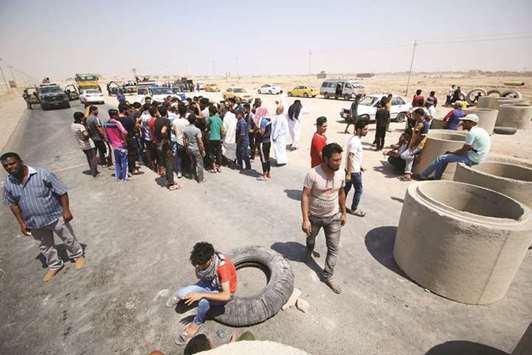About 200 protesters gathered at the main entrance to Iraq’s Siba natural gas field yesterday, police sources said, following more than a week of unrest over poor services sweeping southern cities amid political uncertainty.
Growing anger has put a spotlight on the performance of Prime Minister Haider al-Abadi, who is seeking a second term after a May 12 parliamentary election, which reflected widespread discontent over hardships and corruption.
The crumbling oil hub of Basra and others parts of the south have long been neglected, first by dictator Saddam Hussein and then other governments after him. Similar protests have occurred in the past.
This time the unrest is more widespread and demonstrators have for the first time attacked provincial government headquarters and even buildings belonging to powerful paramilitary groups.
Three demonstrators have been killed in clashes with security forces and dozens were wounded.
In a rare move, protesters stormed the international airport in Najaf, a holy city, temporarily halting air traffic.
Abadi has announced that his caretaker government would release funds for water, electricity and health services in Basra, once dubbed the “Venice of the Middle East” for its network of canals.
Yesterday’s demonstration has not affected operations at Siba, which is run by Kuwait Energy PLC, Siba officials said.
“We have demonstrated near the field to press the company to give us jobs. We are living nearby and watching every day hundreds of workers here sitting jobless and can hardly give food to our children,” said Salim Khasbawi, who is unemployed. Residents of the southern oil-exporting city of Basra have gathered at the main gate to three major oil fields — West Qurna 1, West Qurna 2 and Rumaila.
Local officials said demonstrations have not affected crude production in Basra, whose shipments account for more than 95% of Opec producer Iraq’s state revenues.
Any disruption could have a severe impact on the country’s limping economy and push up global oil prices.
Anger is mounting at a time when politicians are struggling to form a government after the election, which was marred by allegations of fraud that prompted a recount.
The political bloc led by populist cleric Moqtada al-Sadr came first in the election after promising to ease poverty, create jobs and fight corruption. There have been no reports of attacks directed against Sadr’s political bloc or followers.

Iraqi protesters block the road during a protest in the south of Basra, yesterday.
